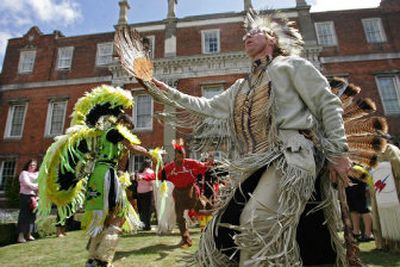Indians from Virginia visit England grave of Pocahontas

GRAVESEND, England – American Indians from Virginia traveled to the burial place of Pocahontas on Friday as part of celebrations marking next year’s 400th anniversary of the founding of Jamestown, the oldest English settlement in the New World.
A 50-member delegation attended a private ceremony to honor their fabled ancestress, who acted as an ambassador between British settlers and her Algonquin kinsmen in the early 17th century.
“We’re here to acknowledge the fact that the people of England have protected the remains of Pocahontas – they have honored her memory, and I think they’ve just done due diligence,” said Chief Stephen Adkins of the Chickahominy tribe.
The moment was tinged with sadness for Adkins, who noted that when the first English settlers landed in 1607 there were 35 to 40 Virginia woodland tribes. “There are now eight,” he said.
The visit was part of a series of events on both sides of the Atlantic to mark the anniversary of Jamestown’s settlement in 1607. The Virginia Indians reveled in the chance to do the journey in reverse – from the New World to the old one – and to show off the finer points of their culture.
Amid blustery summer winds, spectators lined the manicured hedges of an Elizabethan manor lawn to watch as nine men from the delegation – most swathed in fringed buckskin tunics, turkey feather bustles and deerhide pelts – circled around a drum, pounding in unison and singing the names of the tribes.
Pocahontas is known for saving New World explorer Capt. John Smith from execution in 1607, and legend has it the two later became lovers. About five years later she was kidnapped by the English to be used as a pawn in dealings with her father, Powhatan, chief of the Algonquin Nation.
Pocahontas converted to Christianity in 1613 and married tobacco planter John Rolfe. The couple sailed for England in 1616, but the newlywed princess became ill and died of an undetermined illness the next year.